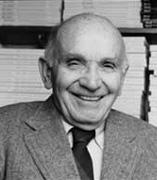Irving M. London, MD, was born in Malden, Massachusetts in July 1918 to Russian Jewish parents. He survived polio as a child, graduated from Malden public schools, and began his academic career at Harvard College where he received the Bachelor of Arts, summa cum laude, in 1939. Dr. London was grateful for the scholarship he received from Harvard and for his National Youth Administration library job, which together enabled him to cover tuition, room and board fees comfortably. Despite the Great Depression, he enjoyed the luxury of living on campus in Cambridge and the ability to travel daily to Hebrew College in Roxbury where he simultaneously earned a second bachelor's degree.
One of Dr. London's most rewarding accomplishments at Harvard College was participating in a committee that raised funds to bring 14 talented refugee students from Nazi-occupied Europe to Harvard - a complex undertaking recently described in Harvard Magazine. Nearing graduation, he debated whether to attend law school or medical school. He delivered a controversial graduation address - noted by The Boston Globe as radical for its time - based on his thesis on "The Jeffersonian Tradition in American Nationalism", and ultimately began his medical studies at Harvard Medical School from which he graduated in 1943.
Dr. London moved to New York after medical school to begin his internship at Columbia-Presbyterian Medical Center, then joined the military from 1944 to 1946 as captain in the Medical Corps. Here he was part of the group that demonstrated the effectiveness of chloroquine as an anti-malarial drug - research of special interest to the military at the end of World War II. At the end of his military career, he was assigned to serve as physician for the Congressional delegation to the atom bomb tests at Bikini Atoll in the South Pacific.
Dr. London returned to New York after his military service, first as a medical resident at Columbia-Presbyterian, then as a research fellow in the department of biochemistry at Columbia University College of Physicians and Surgeons where he soon joined the faculty and began his teaching career. As a postdoctoral fellow he pursued an understanding of what controls the lifespan of the human red blood cell in normal and pathological conditions.
During this time, Dr. London traveled widely to present his research and made several trips to Paris where, in 1949, he met his wife, Huguette Piedzicki (1925-2002). After a trans-continental courtship, the couple married in 1955 and settled near the Hudson River in Riverdale in the Bronx where their two sons were born. Sons Robb and David and Robb's children, Jacob and Danielle, brought joy, pride and companionship to Dr. London - along with a warm extended family scattered from Boston to Denver.
In 1954, at age 36, Dr. London accepted the position of founding chair of the department of medicine at Albert Einstein College of Medicine in New York where he served as professor and chair of the department - and directed medical services at the Bronx Municipal Hospital Center - from 1955 until 1970.
In 1968, Jerome Weisner, then provost of MIT, and Robert Ebert, dean of Harvard Medical School, invited Dr. London to serve as consultant to MIT and HMS to aid in planning a program joining the two institutions. In short, after a year consulting on the project, he devoted a sabbatical year in Cambridge in 1969-1970 to laying the groundwork for the venture and enlisting the support of the faculties of both institutions. After much soul-searching about relocating, he accepted the directorship of the new entity - known then as the Harvard-MIT Program in Health Sciences and Technology - HST - now the longest surviving collaboration between Harvard and MIT. HST would represent Dr. London's intense commitment to the integration of medical education and university education and to the integration of interdisciplinary biomedical research, education and medical practice. As professor of medicine at HMS and professor of biology at MIT, Dr. London served as HST's director and strongest advocate until 1985.
Dr. London received numerous awards and honors over the years for his groundbreaking work explaining the molecular regulation of hemoglobin synthesis at the level of gene transcription and translation into protein. The honors include: the Welch Fellowship in Internal Medicine of the National Academy of Sciences from 1949-1952, the Theobald Smith Award in Medical Sciences of the American Association for the Advancement of Science in 1953, the Commonwealth Fund Fellowship at Institut Pasteur from 1962-1963, election to the American Academy of Arts and Sciences in 1963, charter membership in the Institute of Medicine of the National Academy of Sciences in 1970, and elected membership in the National Academy of Sciences in 1971. From 1982-2003, he served first on the board of directors and then on the Biosciences Advisory Committee of the pharmaceutical company Johnson & Johnson.
Looking back over his career, Dr. London derived great satisfaction from having played a key role in the founding of three institutions known for their contributions to medical research, practice and education - Albert Einstein College of Medicine, the Institute of Medicine of the National Academy of Sciences, and, of course, HST. Passionate and at every opportunity an advocate for HST, he continued to teach and co-direct HST.140, Molecular Medicine until his passing on May 23, 2018.

